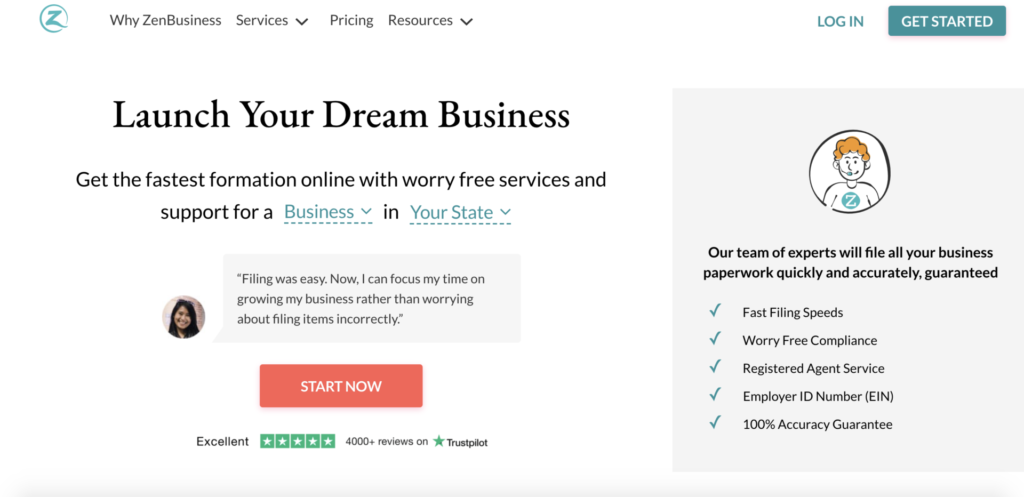
A Step-by-Step Guide to LLC Formation
How to start an LLC & where to begin?
One of the most crucial steps in starting your company is determining the best business structure as an owner. With so many options, each with its advantages and disadvantages, it can be tricky to decide on the best fit.
Small business owners have the option of setting up an LLC, which is an excellent option known for being a safe yet flexible business structure.
Whether you are interested in setting up your business as an LLC or are just looking to find out more information, you’ve come to the right place.
This article will discuss the details of what an LLC is, the advantages, and how to start an LLC for your business.
What is an LLC?
A limited liability company, or LLC, is a legal entity formed to start your business. In this business structure, owners are protected from being held personally liable for any debts or liabilities the company takes on.
An LLC is a hybrid that blends the benefits of two business structures, partnerships, and sole proprietorships, together. As a result, these types of businesses can become a single member LLC or a multi member LLC, which become known as LLC “members.”
Other Common Business Structures
Aside from LLCs, there are various business structures you can also consider for your company. According to the United States Small Business Administration (SBA), you should always opt for a business structure that provides you with the proper balance of benefits and legal protection.
Keep in mind that the way you structure your business will directly impact the following:
- How much you pay in taxes
- How you can raise money
- Paperwork needed to file
- Personal liability
Here is a quick overview of some of the other common business structures you might have heard of or be considering.
Sole Proprietorship
In a sole proprietorship, you will have complete control over your business. Sole proprietorships are easy to form, and your business will automatically be considered one if you don’t register yourself as any other type of business.
Good For
Sole proprietorships are an excellent option for low-risk businesses or businesses looking to try out their ideas before becoming more formalized.
Partnership
If more than one person is involved in the business, a partnership is the simplest business structure to form. The two most common forms of partnerships you will see are limited partnerships (LP) and limited liability partnerships (LLP).
Good For
Forming a partnership is a good option for those businesses with multiple owners involved. Groups such as attorneys or other groups looking to try out their ideas before becoming more formal may also benefit from forming partnerships.
Corporation
A C corp, or corporation, legally separates businesses from its owners. While corporations offer the highest level of protection for business owners’ assets, it comes at a cost. In some instances, corporate profits face double taxation, once when the profits hit and again when paid to shareholders.
In addition to traditional C corps, there are other types of corporations, including S corps, B corps, close corporations, and nonprofit corporations.
Good For
Corporations might be a good option for businesses that have medium to high-risk levels. They are also great in terms of being able to raise money and even better for companies who are aiming to go public or sell in the future.
Cooperative
Cooperatives can be a business or an organization that is owned and operated to benefit those utilizing the services.
Combine Different Business Structures
You can also combine specific business structures as an understanding of tax status. For example, as an LLC, you can choose to be taxed as a C corp, S corp, or nonprofit.
Benefits of an LLC
When you file your company as an LLC, it helps solidify your standing in the business world. This motion shows other businesses and potential customers that you are willing to do what it takes to be a legally operating business.
Choosing to form your business as an LLC allows you to take advantage of the benefits of both a corporation and a partnership structure. Some of these benefits include:
Protection of Personal Assets
- Liability protection.
The LLC will have its liability that does not automatically extend to the owners. That means the LLC protects the liabilities and debts incurred from the business. In most situations, your assets, such as your car, home, or savings, will never be at risk if your LLC is faced with lawsuits or bankruptcy.
Business Profit Taxation
In an LLC, your profits and losses can pass through to your income without having to have corporate taxation.
Simple to Create and Maintain
The formation of an LLC requires minimal paperwork and requirements. They are known for being easy to start and simple to maintain.
Minimal Restrictions
Your business matters can be managed by more than one owner or member while still being one main business to the public. This means all decisions and transactions behind the scenes can be equitably distributed while presenting one entity as you move forward.
Heightens Credibility
As you move forward, your LLC will continuously be recognized as an entity. People and other businesses prefer doing business with a legitimate entity because it shows your level of professionalism.
Access to Business Loans
When you form your LLC, you will obtain a DUNS number and build your business credit, helping you to further build upon your business.
Flexible Profit Distribution
In an LLC, you are not required to spread the distribution of profits equally across the owners. You have full control over profit distribution in an LLC.
Good For
An LLC business structure is an excellent choice for both medium and higher-risk level businesses. You might always want to consider opting to go with an LLC if you have a significant amount of personal assets to protect from your company. And lastly, LLCs are great for owners who are interested in paying lower tax rates than corporations.
How to set up an LLC
If you have decided to move forward with forming an LLC for your business, you will need to follow these steps to be successful.
1. Identify State
First things first, you need to figure out what state you will be operating your LLC. You have the option to form the LLC state where you live, or in other instances, you might choose to file outside.
2. Name LLC
Every state has different rules regarding business names that you will want to find out more information on once you select your state. As a general rule of thumb, you can expect the following conditions for naming your LLC:
- Name must include “limited liability company” or “LLC” or “L.L.C.”
- It cannot be confused with a government agency
- Certain words are restricted (bank, attorney) and require additional paperwork
3. Choose a Registered Agent
A person, or separate business, that receives and sends legal documents on behalf of your company is known as a registered agent. Typically, states require LLCs to use registered agents within the state of the business.
4. File With State
Every state has specific guidelines and requirements involved with the formation of an LLC. First, you will have to apply for the LLC through the Secretary of State’s website. Some states allow you to file online, while others may request a mail-in form as well.
5. Determine Management Structure
Because you have complete control over your management structure as an LLC, it is time to figure that part out. You can opt to be member-managed or manager-managed, depending on what makes the most sense for your business.
6. Create LLC Operating Agreement
If your LLC has two or more members, it should have an operating agreement. Although it’s not required to get an LLC, this outlines how the business is structured and will operate among the members.
Some of the sections you will typically find covered in an LLC operating agreement include:
- Organization
- Management
- Voting
- Capital distributions
- Distributions
- Dissolution
7. Create an EIN
The Employer Identification Number (EIN), also known as your Tax ID Number, comes from the Internal Revenue Service (IRS) and is an identifier for your business. It consists of a unique nine-digit number and is imperative for a business. The EIN legally allows you to:
- Open a bank account
- Apply for a business licenses
- File your tax returns
8. File With Other States
Once you have completed filing for your home state as an LLC, you will want to make sure you qualify in any other states you plan on operating. Be sure to familiarize yourself with the different requirements of LLC qualification in these other states, so you don’t break laws unknowingly.
8. Business Bank Account
Lastly, you will need to open up a business bank account through your approved bank or credit union.
9. Purchase Domain
Once you have chosen a unique business name, you can go ahead and purchase a domain name that matches your business entity.
Apply for an LLC Online
You have a few options when creating and registering your LLC. You can do it yourself (DIY) or use an online website that incorporates. You can easily apply for an LLC online. You have the option to do it yourself with the Secretary of State or use an online company to do it for you.
Secretary of State
Depending on your state, you can go online and apply for an LLC through the Secretary of State online or by mail. Costs vary for both filing fees and ongoing LLC fees by state.
Form an LLC Online
If you are looking for assistance online, there are plenty of options out there for you. Some of the more prevalent business formation online service providers include:
ZenBusiness

ZenBusiness built its platform to meet the needs of your business throughout its lifetime. When you pay for their services, you’ll receive a personalized dashboard to your business to store documents, receive alerts, and manage your website.
All of their pricing plans come with a free registered agent for the first year.
ZenBusiness charges based on a tier system. There are three different tiers with pricing as follows:
- The Starter = $49 annually
- The Pro = $199 annually
- The Premium = $299 annually
IncFile

IncFile provides you with a full suite offering startup services to best support your business formation.
Their pricing model also depends on the state you are filling. You can generate a personalized quote on their website by entering in the necessary information of your business.
Legal Zoom

LegalZoom is an online legal service provider that helps you to be able to create legal documents without having to pay the expensive lawyer fees. Some of the services they provide assistance to include business formation, copyrights, and trademarks.
If you need a registered agent, look elsewhere.
LegalZoom has many different pricing options available. For their LLC service, pricing begins at $79 + the allotted state filing fee.
Key Points to Remember About Forming an LLC
Filing an LLC helps solidify your place in the business world, demonstrating that you’re ready to operate as a legal entity and are serious about what you do. This is an amazing first step in creating a legacy of your own. Once you file and receive confirmation of your status, the business will be recognized by the IRS and other businesses.
Here are a few key points to keep in mind:
Liability
The LLC will have its own liability that does not automatically extend to the owners. That means the LLC protects the liabilities and debts incurred from the business. In most situations, you will be safe from having your personal assets seized to pay debts incurred you cannot repay unless you used a personal guarantee for the debt.
Credibility
As you move forward, your LLC will continuously be recognized as an entity. People and other businesses like doing business with a legitimate entity. You will also be able to obtain a DUNS number and build your business credit.
Management
Your business matters can be managed by more than one owner or member while still being one main business to the public. This means all decisions and transactions behind the scenes can be equitably distributed while presenting one entity as you move forward.
It’s easy to make mistakes when getting your business off the ground. Don’t go it alone. Using ZenBusiness as your go-to business solution makes things easy. From filing your documents to getting the advice you need to move forward, ZenBusiness is there every step of the way.
After Starting an LLC
Once you’ve started the process of forming your LLC, there are a few other pieces of business to handle. Make sure to keep in mind these following things and make sure you take care of them accordingly:
- Set up taxes
- Set up unemployment insurance
- Decide who handles your accounting
- Acquire permits
- Determine insurance policies
- Double-check hiring laws
- Apply for business licenses
Although you have followed the steps to creating your LLC, the job is not done. Following these additional steps will ensure the safety and security in the setup of your business.
Conclusion
You’ve filed your LLC and received your Certificate of Status. What’s next? You’ll need to figure out your brand voice and how you want to speak to your audience, create a logo, colors, branding, website, phone number, and how you will get the word out to the public.
If you’re in it for the long haul, trademarking your name should be on the list. Finally, once all the moving parts are in place, it’s time to schedule your launch. This could entail having a pre-sale or something different, but it’s always best to create a schedule and stick to it.
It’s easy to make mistakes when getting your business off the ground. Don’t go it alone. Using ZenBusiness as your go-to business solution makes things easy. From filing your documents to getting the advice you need to move forward, ZenBusiness is there every step of the way.
FAQ
How Much Does It Cost to Start an LLC?
LLC filing fees vary depending on the state you plan on filing but can range anywhere from $40-$3,000. You can quickly check online with the Secretary of State website to determine the costs associated with forming an LLC.
Can You form an LLC on Your Own?
Yes, you can start forming an LLC on your own by following the step-by-step instructions provided in this article. For additional help, seek resources from online tools or by hiring a lawyer.
Do You Need a Lawyer to Start an LLC?
No. You do not need a lawyer to start an LLC. It is entirely legal for you to prepare and file the necessary documents on your own. You can also utilize online business formation services, like the ones listed in this article, with ZenBusiness being at the top of that list.
Does an LLC Need to Make Money?
LLCs are not required to have income or post any profits. Keep in mind that if an LLC business owner is claiming tax deductions without reporting income, this will likely flag the IRS to conduct an audit to determine if the LLC has been set up for the right reasons.
What Is the Downside to an LLC?
While LLCs reap the benefits of partnerships and corporations, there are some downsides to consider before forming one of your own. LLCs members are deemed self-employed and must pay self-employment tax contributions towards both Medicare and Social Security.
Also, LLCs may have a limited lifespan in certain states. If a member within an LLC leaves, some states will require the LLC’s dissolving, requiring you to reform a new LLC with the involved members.
